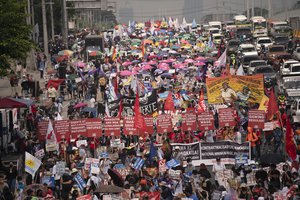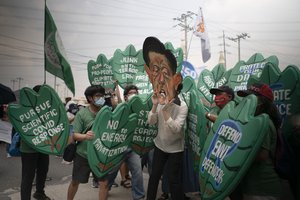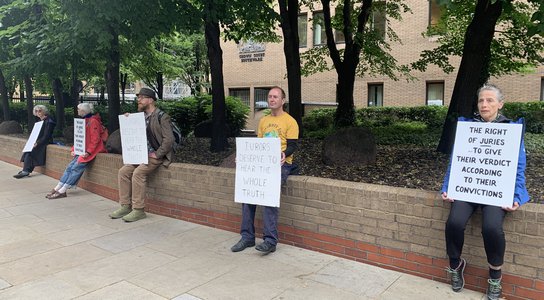President Ferdinand ‘Bongbong’ Romualdez Marcos Jr. foreshadows a six-year agenda that prioritises business profits over the rights of people and planet.
While talking of recovery for the Philippines, a country blighted by the pandemic but equally squeezed by the climate emergency, the newly inaugurated President in his first State of the Nation Address paid lip service to climate action and made no reference to the country’s human rights record or corruption.
Marcos’ ‘Build better and more’ agenda – ‘a red flag for human rights’
Steaming ahead with development projects without any consideration for human rights raises serious concerns about the future of land and environmental defenders in a country with one of the highest levels of killings of defenders in the world.
Marcos declared that infrastructure development will remain “a very high priority” with emphasis placed on enabling private sector contracts and investment incentives including within the energy sector. Plans to expand “existing power sources” are “limited” but appear on the table, alongside commitments to expand natural gas reserves, build new nuclear power plants and invest in the renewable sector. This is lukewarm news for environmental and climate activists who have appealed for the Philippines’ untapped mineral resources to be left intact – including estimated coal reserves at about 2.4 billion tons. Deregulation of the mining industry is already underway, including the removal of a 4-year ban on open pit mining and opening up the industry to new mining applications. This undermines pledges that commit the Philippines to a 75% reduction in greenhouse gas emissions by 2030, and a suspension on developing new coal plants.

Filipino people led a protest urging the government and the newly elected President Marcos Jr. to take responsibility in ensuring that the lives of the Filipino people are improved. Photo: Rajiv Villaber
Violence and mining go hand in hand, with 31% of land and environmental defenders killed in the Philippines between 2012 and 2020 connected to mining.
“Marcos has a window of opportunity to set out clear priorities and policies that don’t sacrifice the rights of affected communities for economic benefits” says Jaybee Garganera, National Coordinator for during Alyansa Tigil Mina (ATM) – an anti-mining network. “The absence of environmental and human rights is notable – and a red flag for us. If this government pursues more aggressive extractive projects without rights being protected, this could result in resistance from affected communities. Instead, the government should prioritise proposed legislation like the Alternative Minerals Management Bill and the Sustainable Forestry Management to ensure development is fair and rights protected”.
“The biggest sin of omission during Marcos' State of the Nation Address is the zero mention of human rights,” notes Leon Dulce, National Coordinator of the Kalikasan People's Network for the Environment. The Philippines has been consistently reported as the worst country in Asia for attacks against land and environmental activists. The criminalisation of defenders and rights advocates is widespread with the practice of ‘red-tagging’ - the government practice of accusing activists of communist insurgency - commonly used to silence critics and communities.
Despite concerns, Marcos has avowed to continue the National Task Force to End Local Communist Armed Conflict (NTF-ELCAC) amid allegations of notorious red-tagging. Opportunities to address this were missed explains Leon: “There are a lot of environmental policy proposals that were left out of the State of the Nation Address. They missed proposals for greater protections and mechanisms for land and environmental defenders, for instance the proposed Environmental Defence Policy [a bill that seeks to increase protections for environmental defenders].”
“For the environmental movement in the Philippines, environmental defenders are the frontline of the defence. So, whether it's advocacy on mining or against dirty energy, or preserving the biodiversity and even prime agricultural land, defenders played a significant role in making sure that the government doesn't cross the line. The Philippines is the deadliest country in Asia for defenders as reported by Global Witness. We do not want that to continue. However, under this administration, that is a fear that is lingering in our hearts,” warns Jaybee.

On July 25, 2022 - the day of Philippine President Ferdinand Marcos Jr.’s State of the Nation Address - members of the Kalikasan People's Network for the Environment join the protests demanding that the newly elected president take action towards climate justice and protecting people’s rights. Photo: Dennese Victoria
Failure to address impacts of climate change
Marcos failed to recognise the destructive impacts of climate change on people and planet, particularly its potential to disrupt the domestic agricultural sector (which employs around one-third of Filipinos) and create food insecurity. Already, future impacts are forecast to be disastrous for people and planet - with predicted increases in extreme weather patterns and climate-related disasters affecting not only the environment but devastating the economy. The impact of climate change on agriculture is projected to cost the Philippine economy about Php 26 billion (4.7 billion USD) per year through 2050.
A report by the Asian Development Bank concluded that the Philippines would see a loss of 6% GDP annually by 2100 if it does not mitigate climate change. Short-term investment in climate change adaptation could avert losses of up to 4% GDP by 2100, says the same study.
The Philippines on average is suffering $3 billion in annual damages from extreme climate impacts alone. Marcos talked of “resiliency” in the face of the climate crisis, but our response cannot be to just ‘disaster-proof’ communities. “Despite all the rosy rhetoric in terms of pursuing renewable energy, we are concerned that the proposed economic model will actually cause more human rights violations and increase inequality by cutting corners in terms of environmental regulations to fast track economic projects” Leon continues. The country’s climate assessment reports have pointed to mining, land conversion, and pollution as the key drivers of forest ecosystem destruction and biodiversity loss - issues that were markedly absent in Marcos’ speech.
With Philippines set to continue to experience the devastating impacts of climate, what is clear is that real socio-economic progress under Marcos must go hand in hand with effective climate policy as well as strong protection of human rights and defenders.


